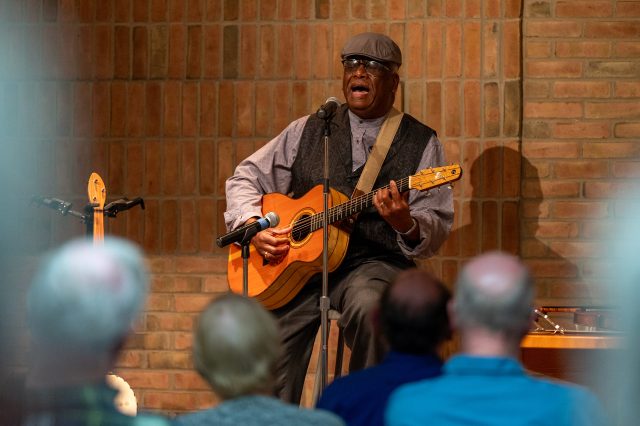[ad_1]
More than four dozen Ann Arbor community members and University of Michigan students gathered at the Gerald R. Ford Library Thursday evening to listen to a lecture and performance by Rev. Robert B. Jones, Sr. Organized by the Gerald R. Ford Presidential Foundation, the event, entitled “The Songs that Healed a Nation,” included stories and performances of famous American songs of spiritual healing.
Jones is a professional musician, storyteller and ordained Baptist preacher from Detroit. Initially a blues performer, Jones now also plays many styles of traditional African American folk and is proficient in a variety of instruments including the guitar, harmonica and fiddle. In 2018, he received the Kresge Artist Fellowship, a $40,000 award in film and music for Metro Detroit artists.
After a brief introduction to the event by Brooke Clement, director of the Gerald R. Ford Presidential Library and Museum, Jones began the performance by expanding on how enslaved people contributed heavily to American culture, specifically musical culture. Jones explained that music often served as an avenue for expressing the emotional and mental tolls of slavery. This style of music combined with European influences to create the distinct style of American music known today. Throughout the performance, Jones told stories about this history of music in America, playing songs in between each tale.
“Those songs did more than just become vehicles for worship,” Jones said. “Those songs healed, those songs allowed us to get past some of our most difficult times, and because we were always listening to each other, always borrowing from each other, it sort of flavored the sound of American music.”
After one of the stories, Jones played his rendition of “Wade in the Water,” an African American spiritual. As he performed, audience members joined and sang along. Jones explained spirituals often explored themes of freedom, which enslaved people were unable to openly discuss. Because of this, songs like “Wade in the Water,” served as a tool of mental escape and resilience during slavery.
“And so you hid those ambitions inside that song, and there were folks who would help you, the angels who would come to (serve as) the conductors along the Underground Railroad, and all those things are embedded in those holy spirituals,” Jones said. “So that’s one of the ways the songs could heal the nation.”
Throughout the performance, Jones switched between the fiddle — which he combined with his harmonica — and the guitar. Jones said the songs of musicians including Elvis Presley and Chuck Berry helped unite children living under segregation.
“You go down to places like Nashville and Memphis, and folks were concerned because Black kids were listening to white music and white kids were listening to Black music,” Jones said. “But those Black kids didn’t care. The white kids didn’t care. There were Black kids who wanted to be Elvis and white kids who wanted to be Chuck Berry. … They were breaking down barriers.”
Jones concluded his performance by explaining the impact of music on conflicts and said he believes songs help bring people together. .
“I think that the songs that heal us are the songs that don’t take sides,” Jones said. “And when we start to put a name on situations and start to define things a little differently, coming away with a different point of view, then all of a sudden, we discover that again, we are more alike than we are different.”
African American folk music has inspired various genres of American music, from bluegrass to rock to country. Richard Weld, education specialist at the Ford Library and Museum, said in an interview with The Michigan Daily that he believes Jones’ emphasis on these shared cultures and connections throughout history is important.
“It’s his message of unity,” Weld said. “The things that connect us are bigger than the things that divide us. … A lot of us are Americans, and the music means a lot to us. It’s part of our shared history, and the way he brings it to life is really exciting.”
LSA junior Lily Aldo told The Daily she appreciated how the event showed how music could promote unity among people from diverse backgrounds.
“I loved it,” Aldo said. “I think community is all that we need, especially since I’m taking a class on American culture, and we’re talking about the 1960s and segregation and music and how it helped unify people.”
After the event, Jones told The Daily that he hoped attendees could take home the understanding that everyone — regardless of their differences — is important to the success of America.
“When we get back to the fundamentals that really represent our country, then I think we can celebrate our diversity,” Jones said. “Instead of tolerating our diversity, we can appreciate that everybody in this country — whether they’ve been here for 300 years, or whether they just got here — everybody contributes something to the greatness of America.”
Daily Staff Reporter Michelle Liao can be reached at mrliao@umich.edu.
Related articles
[ad_2]
Source link











